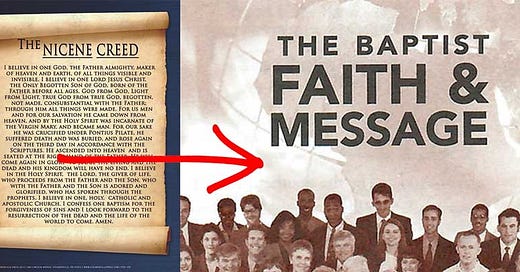Group of SBC theologians and pastors want the Nicene Creed added to the Baptist Faith and Message (BF&M)
A motion is expected to be made at the Southern Baptist Convention (SBC) Annual Meeting by several theologians and pastors to add the Nicene Creed to the Baptist Faith and Message (BF&M), the denomination’s official statement of faith.
According to Pro Gloria Christi, a blog by Malcolm Yarnell, research professor of theology in the School of Theology at Southwestern Baptist Theological Seminary, the aim of the adoption of the Nicene Creed into the BF&M is to provide doctrinal clarity and increased unity within the SBC.
Quoting Article XIX, the blog post states, “At the Southern Baptist Convention meeting in June 2024, Lord willing, we plan to move, and pray the Messengers will agree unanimously, that the Baptist Faith and Message be amended by the adoption of this article, which is also known as the Nicene Creed.”
In addition to Yarnell, Andrew Brown, pastor of First Baptist Church of Starkville, Miss.; Stephen Lorance, pastor of leadership development at Two Cities Church in Winston-Salem, N.C., and Steve McKinion, professor of theology and patristics at Southeastern Baptist Theological Seminary are listed as supporting the motion.
The Nicene Creed was established as a summary of Christian doctrine, in response to the Arian Controversy – a heretical viewpoint on the Father, Son, and Holy Spirit. The creed originated with the Council of Nicaea in 325 and was further amended at the First Council of Constantinople in 381. It provides more detail than the earlier Apostle’s Creed regarding the Persons of the Trinity. The Nicene Creed is a widely recognized Christian statement of faith, used and referenced by Catholics, Methodists, Presbyterians, Lutherans, and Episcopalians.
Historically, Baptists have claimed “no creed but the Bible,” clearly distinguishing themselves from other denominations that use creeds in worship.
In an additional statement posted on Credo, Yarnell said proponents of the motion believe 1) the Nicene Creed authoritatively articulates primary Christian doctrines and has been used for teaching and worship for nearly two millennia, 2) the Creed is a robust summary of orthodox Christian belief, particularly regarding the Trinity and the Lord Jesus Christ, and 3) The motion is seen as a response to internal debates within the SBC, with one group advocating for strict doctrinal purity and another seeking unity on essential doctrines.




